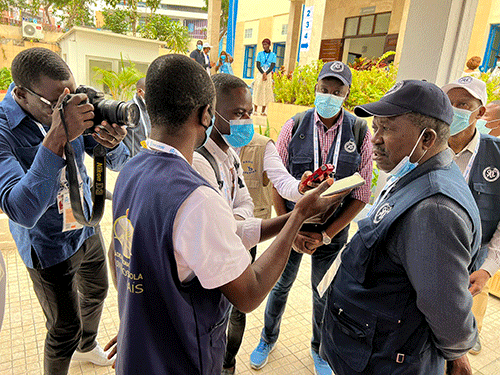The Southern African Development Community (SADC) Electoral Observation Mission (SEOM) described the pre-election and voting phases in Angola held on the 24 August 2022 general elections as peaceful, calm and well organised, which enabled voters to express their democratic will.
General elections were held in Angola last week.
The commission announced preliminary results after processing 97.03% of the ballots, according to which the ruling People’s Movement for the Liberation of Angola (MPLA) party won, securing 51.07% of the votes.
In accordance with Angolan law, the leader of the winning party, incumbent president João Lourenço, keeps the top office.
Unita has repeatedly claimed the electoral process, which was monitored by about 1 300 domestic and foreign observers, was flawed.
According to Namibian defence minister Frans Kapofi, the mission also observed that political parties were able to campaign freely.
“The political and security environment in the pre-election and election period was calm and peaceful, with no political and security risk that could adversely affect the conduct of the elections,” said Kapofi.
The mission commends the Angolan people for maintaining a peaceful political environment during the pre-election and on the voting day.
The mission will release its final report after the validation and proclamation of final results as provided for in the revised SADC Principles and Guidelines Governing Democratic Elections (2021).
The final report will be shared with the National Electoral Commission of Angola (CNE) and all stakeholders.
In terms of the revised SADC Principles and Guidelines Governing Democratic Elections (2021), Kapofi said the long term of observers would remain on the ground to continue with the post-election observation until 9 September 2022.
“The SEAC shall return at an appropriate time to undertake a post-election review to determine the extent to which the recommendations of SEOM have been implemented and the nature of support, if any, that the member state holding elections may require from the SADC region to implement those proposals,” Kapofi noted.
In the event of any electoral disputes, the mission appealed to all contestants to channel their concerns through established legal procedures and processes, and urged all political parties, the Angolan people and all other stakeholders to allow the CNE to announce the final results as legally mandated.
Observers attended campaign activities, including rallies by the contesting parties, saying they were conducted peacefully.
Kapofi said the police maintained a presence at the campaign events that the mission observed and did not interfere with proceedings.
The mission raised concern that given the vast geographical scope of the electoral map of Angola and the 26 443 polling stations, it might have been a challenge for the national observers to cover the length and breadth of the country.
The CNE consists of 17 members: one is a judge appointed by the superior council of the judiciary and 16 are appointed by the National Assembly by an absolute majority of the members in office, based on proposals by the parties and coalitions of political parties in parliament.
The members of the CNE serve for two five-year terms.
The mission noted that voter registration is carried out through the collection of data obtained from the civil identification database of the Ministry of Territorial Administration and information provided by voters.
The mission observed that the CNE reported that 14 399 391 voters, within and outside Angola, were said to be on the voters’ roll, which is an increase of about 50%, based on the registered voters from the previous election cycle of 2017.
Furthermore, the mission noted that although some political parties have put in place policies for the equal participation (50/50) of women in politics, the stakeholders acknowledged the participation of women in the electoral process is still minimal, compared to the relevant demographics.
Out of the eight candidates who had been listed by their political parties as presidential candidates, only one was a woman.


